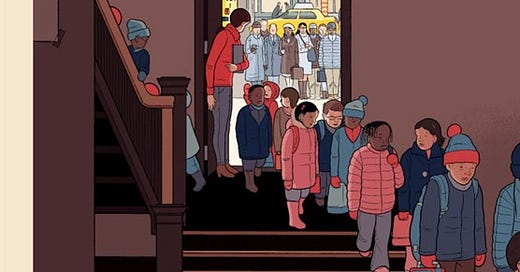The showdown between teachers and parents
It all comes back to the question: What is the purpose of schooling?
This photo was on the cover of the New Yorker following the school shooting at Sandy Hook Elementary School in Connecticut. After seeing this cover I remember thinking: this must be how parents feel every time they send their kids to school, not just after a tragedy occurs. Parents are putting the care and education of their children into the hands of relative strangers, after all. When they think their children might be in harms way while in school, they react, because their instinct is to protect their children. They are not terrorists, they are mothers and fathers protecting their cubs.
Public schools are public because they must accept every child in the district, they are funded by tax-payer dollars, and the school board is elected and accountable to the public. There are exceptions, but these elements generally define what makes a school public. If community members or parents are concerned about the public schools in their community, they can show up to school board meetings to air their grievances and hold their elected officials accountable. That is precisely what parents have been doing lately. Certainly, there have been a few meetings that have gotten out of hand, but by showing up and voicing their concerns, they are exercising their right to do so.
Parents also have the right to choose not to send their children to a public school, charter or traditional. Parents can send their kids to a private school, provided options are available near where they live, or homeschool their children. Once a parent has chosen which type of education to provide their children, they have a responsibility to ensure that their children are being properly educated. This distinction is important: Parents have a right to voice their concerns at school board meeting, where curricular decisions are made, and a responsibility to ensure their children are being properly educated.
Being responsible for your children's education can mean a variety of different things, such as meeting with administrators and teachers to ask questions and express concerns, ensuring their children have adequate space, time, and supplies to learn at home, either to complete homework or to engage in other learning activities, and participating in educational activities like field trips, library visits, and so forth.
Just like parents should be communicating with their child's teacher and school leaders, teachers and school leaders should be communicating with parents. The education of children is a two-way street, which far too often gets neglected. The lack of communication, or better yet, partnership, between teachers and parents contributes to the frustration that parents are expressing at school board meetings. And elected officials making statements such as this are not helping: "I don't think parents should be telling schools what they should teach."
I sympathize with teachers who may resist allowing parents to dictate how and what they teach. As a former teacher, I can imagine myself being thoroughly annoyed by 28 parents marching into my classroom making demands such as which books should be included or excluded in every subject—I highly doubt anything this extreme occurs in public schools at any frequency worth concern. But the claim that's what the so-called "parents rights" movement is all about is missing the point. After months of educating their children at home due to lockdown provisions, parents rightly want more of a say in their child's education. And they are frustrated by efforts to obscure what is being taught in schools. They want the best for their children, and although they might overreact, parents should not be ignored.
There is certainly an argument to be made that teachers are taking advantage of their position, and maybe parents are too, but the bigger issue is the unsettled question: What is the purpose of schooling? Once we have an answer to this question, we can hash out the curriculum as well as the role of teachers versus parents. If the purpose is democratic equality or preparation for self-government, then students need to have a deep and comprehensive understanding of the history of the U.S.—the good and the bad. If the purpose is social efficiency or social mobility, then a hyper focus on skills that will be useful in the workforce makes sense. And if the purpose is social justice, weight should be given to issues of race, gender, and culture in curricula. Because public schools are public, the community in which the school resides, which includes parents, must have a say in the purpose. Teachers, as members of the community, should be included in setting the purpose, but they are not the final arbiters; they work for the public.




